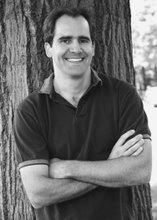The Evolution of a Creationist
 For those of you who have access, there is a great article in this week's Science magazine about Paleontologist Stephen Godfrey.
For those of you who have access, there is a great article in this week's Science magazine about Paleontologist Stephen Godfrey.
Godfrey was raised a young-earth creationist, but had a keen interest in biology from an early age. His parents did not dissuade him from his interests.
"I guess they figured that the young-Earth creationist position was strong enough, was robust enough, that he would believe in young-Earth creationism and he would be a biologist, and that would be fine," says Godfrey.
At college, Godfrey was convinced that scientists were engaged in a vast conspiracy to promote evolution. However, the more Godfrey learned about biology, the more he found his religious beliefs untenable.
"For example, there was the quandary of death. A literal reading of Genesis indicates that no animals perished before Adam and Eve ate the fateful apple--in other words, that there were no carnivores preying on other animals. But in his biology classes, Godfrey learned of predators perfectly framed to kill: cats with stereoscopic vision, enlarged canines, and claws; spiders that weave webs as traps; and sharks that replace serrated teeth throughout their life. "They're not eating seaweed," says Godfrey, who puzzled over how these animals had emerged if God hadn't intended them to prey on others. "That was the first thing at university that really started to disturb me," he says."
Following college, Godfrey entered graduate school in Paleontology at McGill University with Robert Carroll. The major shock came when, on a field expedition to Kansas with Robert Reisz, Godfrey was quarrying through thin layers of rock. "We started to come across footprints of terrestrial animals," says Godfrey. 'You can't imagine a global flood and animals finding ground to make footprints on. … That, more than anything, any other experience in my life, really shook me to the core.' Godfrey agonized about where these footprints might have come from.
Godfrey finally came to embrace evolutionary theory as a postdoc with Reisz. "Godfrey often drove southeast to Dinosaur Provincial Park [in Alberta], passing through a landscape of sediments laid atop one another: deposits from freshwater and terrestrial environments in one, marine organisms and mollusks in another, and a third that mimicked the first, a mix of fossils from fresh water and land. 'These animals were living here in this same place, but they couldn't have all been there at the same time,' he says, a fact that was irreconcilable with flood geology. It was then that 'the rest of the young-Earth creationist ideas kind of exploded.'"
What struck me most about the article is the personal and family difficulties faced by those making the transition.
"'The day I had to tell my mother I wasn't a young-Earth creationist was the scariest day of my life,' says Denis Lamoureux, who teaches science and religion at St. Joseph's College in the University of Alberta in Edmonton, Canada."
People like Godfrey tend not to advertise their painful transition from creationist to evolutionist, certainly not to scientific peers. When doubts about creationism begin to nag, they have no one to turn to: not Christians in their community, who espouse a literal reading of the Bible and equate rejecting creationism with rejecting God, and not scientists, who often dismiss creationists as ignorant or lunatic.
"Nothing else I have done in my life has made me such an outsider," says Brian Alters, director of McGill University's Evolution Education Research Centre in Montreal. Alters has written books on teaching evolution and testified in the 2005 Dover, Pennsylvania, trial against bringing intelligent design--a form of creationism-- into the classroom. But few of his friends or his enemies know that Alters, who had a fundamentalist Christian upbringing in southern California, rejected creationism in college. More than 2 decades later, he says, "I still have childhood friends and relatives who won't speak to me."
Personally I find the heated rhetoric on both sides of the debate distasteful (although I, too, confess to such rhetoric on occasion). Hopefully we can come to understand and have compassion for those of us that are struggling to understand our world.Godfrey is the author of Paradigms on Pilgrimage: Creationism, Paleontology and Biblical Interpretation. A profile of Godfrey is available here.
Photo taken by R.A. Price. Steeply dipping axial plane cleavage. These folded sedimentary layers exposed near Sullivan River in southeastern British Columbia dramatically illustrate the awesome forces constantly at work reshaping the features of the earth. One of the Geological Survey of Canada's tasks is to examine, study, and report on the effects and the causes of such forces.











Great post on many levels. Thanks for sharing the power of science.
ReplyDeleteMy first reaction was shock that it took Godfrey until his postdoc to abandon YECism. It's really difficult for me to imagine holding onto something like that as long as he did.
ReplyDeleteWhat really hit home was the fact that I would be one of those unsympathetic people who "dismiss creationists as ignorant or lunatic". That isn't a nice thing to realise.
The funny thing is that, as someone who has (IMO) successfully managed to reconcile religion and evolutionary biology (and not "theistic evolution"), I should be better at communicating with a wavering YEC...but I think I'd be worse than the average person. YECism not only requires an intentional misreading of the evolutionary record - it also requires a similar misreading of the bible.